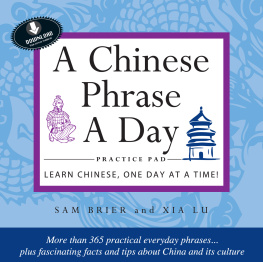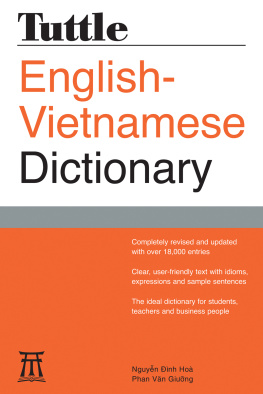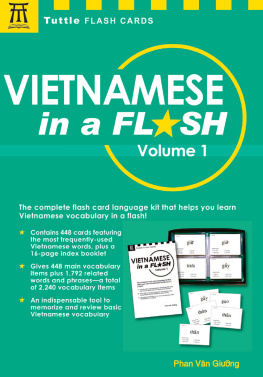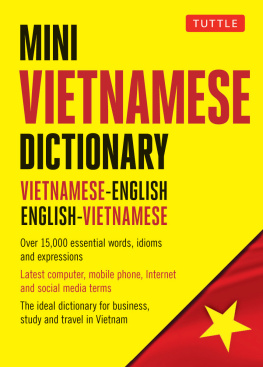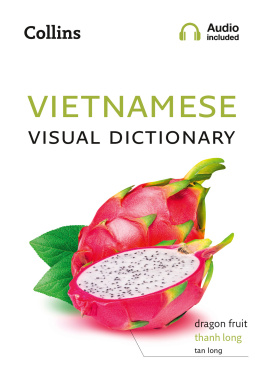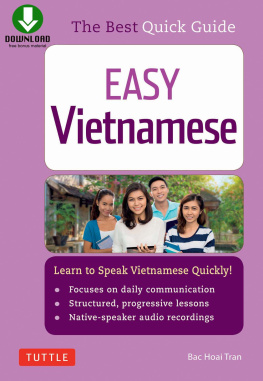Acknowledgments Wed like to thank ip L (M hai), Dip Nguyn, and Thun Nguyn, for reviewing and editing the Vietnamese text. We also want to thank our family and friends in Vietnam for being so exceptionally caring, humorous, and supportive of our effort to navigate Saigon and relearn the culture. Linh would like to thank her parents for speaking Vietnamese to her at home after moving to the U.S., and encouraging her to stay connected to the Vietnamese community in the States and in the motherland. Linh works as a communications and research consultant in the U.S. and Vietnam. Sam would like to thank his parents and grandparents for sending him to study abroad in high school and college.
Those travels led him to work in Asia, start Academic Experiences Abroad (AEA), and write this book. AEA creates affordable and highly customized programs throughout Asia and other parts of the world for university, business, and family groups. A portion of the profits from this book goes toward AEA scholarships. To learn more about AEA and AEA scholarships, please visit www.AEA-Asia.com. Sam, Linh, and their son, Dashiel, travel to Asia often, but not as often as before Dash. If you have an interest in Asia, Sam would like to hear from you.
He can be reached at Sam.Brier@gmail.com. 


Contents
For Dash Published by Tuttle Publishing, an imprint of Periplus Editions (HK) Ltd. www.tuttlepublishing.com Copyright 2011 by Periplus Editions (HK) Ltd. All rights reserved. No part of this publication may be reproduced or utilized in any form or by any means, electronic or mechanical, including photocopying, recording, or by any information storage and retrieval system, without prior written permission from the publisher. 1st ed.
192p. 16cm.
ISBN: 978-1-4629-1015-1 (ebook)
1. 16cm.
ISBN: 978-1-4629-1015-1 (ebook)
1.
Vietnamese languageConversation and phrase booksEnglish. 2. Vietnamese languageSpoken Vietnamese. 3. Vietnamese languageSelf-instruction. I.
Doan, Linh. II. Title.
PL4375.B75 2011
495.9'2283421dc22 2011004775 Distributed by North America, Latin America & Europe
Tuttle Publishing
364 Innovation Drive
North Clarendon, VT 05759-9436 U.S.A.
Tel: 1 (802) 773-8930
Fax: 1 (802) 773-6993
info@tuttlepublishing.com
www.tuttlepublishing.com Asia Pacific
Berkeley Books Pte. Ltd.
61 Tai Seng Avenue #02-12
Singapore 534167
Tel: (65) 6280-1330
Fax: (65) 6280-6290
inquiries@periplus.com.sg
www.periplus.com First edition
16 15 14 13 4 3 2 1 1310CP
Printed in Singapore TUTTLE PUBLISHING is a registered trademark of Tuttle Publishing, a division of Periplus Editions (HK) Ltd. 
PART 1
Unlike English, Vietnamese doesnt have different greetings for different parts of the day, and the Vietnamese address the person spoken to after each greeting. Accordingly, forms of address are more important for the Vietnamese.
For this, see section . Hello, Sam. Cho Sam. Ch[J]ow Sam. Hello, friend. Cho bn.
Ch[J]ow ban[g]. This is said to someone close in age that you do not know. Hello/Good-bye. (polite) Xin cho. Seen ch[j]ow. Cho Linh. Cho Linh.
Ch[J]ow Linh. See you later. Hn gp li sau. Hen gahp lai show.
Thank you is less common in Vietnam than in Western countries and is usually reserved for when thanks are truly in order, such as when someone has gone out of their way to help. Having said that, you are a visitor, and saying anything in the local language can go a very long way, so say it as often as youd like.
Just dont expect to hear it much. Thank you. Cm n. Gam uhn. Thank you (em/anh). Cm n (em/anh).
Gam uhn (am/ahn). NOTE : Em is a form of address that means you to someone who is younger than the speaker and means I if the speaker is the younger. In place of em , another form of address can be substituted, such as anh . Anh is used to address a man your age or slightly older, or means I if the male speaker is the same age or slightly older. These are two of the most common you will use. See sections .
Youre welcome./Dont worry about it. Khng sao. Kohng show. Dont worry about it./Its no big deal. Khng c chi. Kohng gaw ch[j]ee.
Youre welcome./Dont worry about it. ng khch so. Doung kak show. Lit.: Dont be so polite.
| Sorry/Excuse me Xin li Seen loy |
Sorry./Excuse me. Seen loy. Seen loy.
In the South, x often sounds like sh, but in the North it is more clearly pronounced s. Excuse me, may I get by? Xin li, cho ti i qua. Seen loy, ch[j]aw dtoy dee gwa. Excuse me, I dont understand. Xin li, ti khng hiu. Seen loy, dtoy kohng hyew.
Excuse me, do you have a pen? Xin li, anh c bt mc khng? Seen loy, ahn gaw but mouk kohng? Anh is used to address a male your age or slightly older. Excuse me, would you repeat that? Xin li, FORM OF ADDRESS lp li gim. Seen loy, FORM OF ADDRESS lahp lai z[y]um. NOTE : There is another term for Excuse me when youre trying to get the attention of a waiter. If it is a male your age or slightly older, you would say, Anh i [Ahn uhy], and if it is a younger man or woman, you would say, Em i [Am uhy].
| Please Gim/Lm n Z[Y]um/Lam uhn |
Gim is never used alone but always in phrases like those below.
Please speak slowly. Ni chm gim. Nawy ch[j]uhm z[y]um. Would you help me, please? FORM OF ADDRESS lm n gip gim ti. FORM OF ADDRESS lam uhn z[y]up z[y]um dtoy. Lit.: Please help me.
Just a moment, please. Xin i gim mt cht. Seen duhy z[y]um moht ch[j]ut. i mt cht (lit., Wait a minute) is more colloquial than using gim . Please wait a bit. Xin ch mt cht.
Seen ch[j]uh moht ch[j]ut. Xin is used to imply please in this case. Please continue. Xin tip tc. Seen dteep dtup. Please stop.
Xin ngng li. Seen ngoung lai. Excuse me, can I have the check, please? Anh/Em i, xin cho ti ha n gim. Ahn/Am uhy, seen ch[j]aw dtoy hwah duhn z[y]um. This is a rather polite. Excuse me, the bill, please.
Anh/Em i, tnh tin gim. Ahn/Am uhy, dtihn dteen z[y]um. This is more colloquial and common in the South. Please come in. Xin vo.
There are many, many forms of I, and the correct one depends on the speakers position in the hierarchy of each situation (with respect to age, social status, etc.), but fortunately, the term Ti can be used safely by almost anyone in almost any situation.
There are many, many forms of I, and the correct one depends on the speakers position in the hierarchy of each situation (with respect to age, social status, etc.), but fortunately, the term Ti can be used safely by almost anyone in almost any situation.
Keep in mind that, although you might use this term regularly, the person you are speaking to may choose to use another form, which can be found in section . If you are friends with the person you are speaking to, you can use your name in place of Ti . Im American. Ti l ngi M. Dtoy la ngouy Mee. Im here on vacation.


